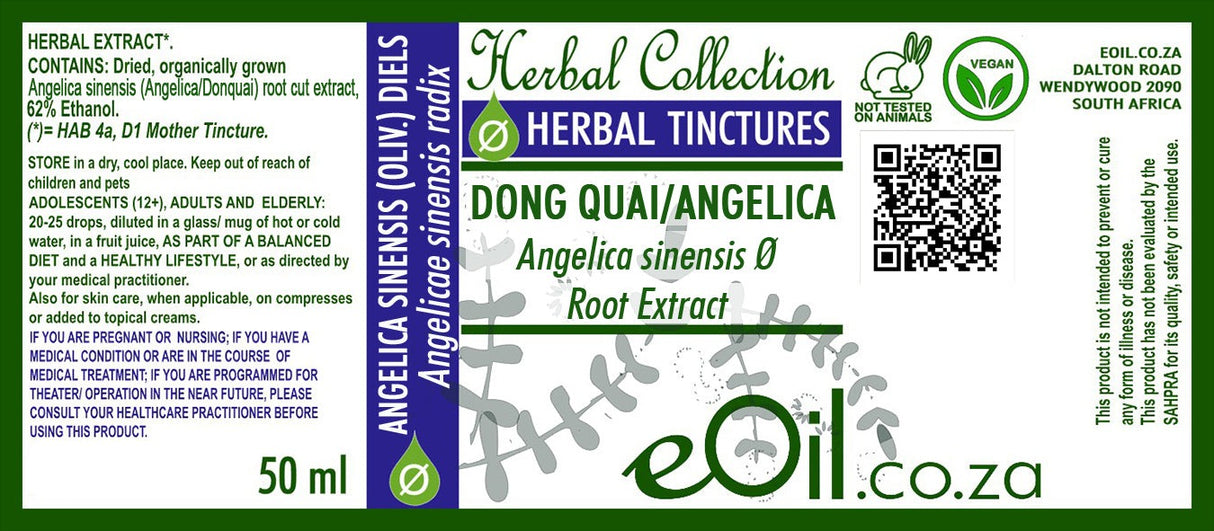Dong Quai - Angelica - Liquid Herbal Extract
Dong Quai - Angelica - Liquid Herbal Extract - 50 ML is backordered and will ship as soon as it is back in stock.
Description
Description
Understanding Mother Tinctures & Glycerines
Dong Quai – Angelica Liquid Herbal Extract is crafted from the roots of Angelica sinensis, a herb with a longstanding tradition in botanical wellness.
Its naturally earthy, aromatic profile makes it a valuable addition to daily herbal routines.
Suitable for plant-based lifestyles, this concentrated extract is ideal for use in teas or blends—pure, natural, and additive-free
TRADITIONALLY USED FOR
Dong Quai, also known as Angelica sinensis or "female ginseng," is a traditional Chinese herb with a long history of use in herbal medicine.
It is commonly consumed as a tincture, which is a concentrated liquid extract made by soaking the herb in alcohol to extract its medicinal properties.
Although more research is needed to confirm its efficacy, Dong Quai tincture is believed to have various health benefits, particularly for women.
Some of the potential properties and benefits of Dong Quai tincture include:
- Hormonal balance: Dong Quai is often used to help regulate hormonal imbalances in women, particularly those associated with menstrual irregularities, premenstrual syndrome (PMS), and menopause. It is thought to have a balancing effect on estrogen levels, which can alleviate some of the symptoms of hormonal fluctuations.
- Blood circulation: Dong Quai is believed to have blood-thinning properties and may help improve blood circulation. This can be beneficial for individuals with conditions such as high blood pressure or those experiencing cold hands and feet due to poor circulation.
- Anti-inflammatory and analgesic effects: Dong Quai may have anti-inflammatory and analgesic properties, which could help relieve pain and inflammation associated with conditions like arthritis or menstrual cramps.
- Immune system support: Dong Quai is thought to have immune-boosting properties and may help protect against infections and illness.
- Anemia: Traditional Chinese medicine uses Dong Quai to treat anemia, as it is believed to help increase the production of red blood cells and improve iron absorption.
- Stress and mood: Dong Quai is thought to have a calming effect on the nervous system, which may help alleviate stress, anxiety, and depression.
- Antioxidant properties: Dong Quai contains antioxidants that may help protect cells from oxidative damage, thus reducing the risk of chronic diseases and aging-related conditions.
It is essential to note that while Dong Quai tincture may offer potential health benefits, it is not a substitute for medical advice, diagnosis, or treatment. If you are considering using Dong Quai or any herbal supplement, consult with a healthcare professional before starting any new treatment, especially if you are pregnant, breastfeeding, or taking medications.
INFORMATION
Source : http://www.wikiphyto.org/wiki/Epine-vinette
Reference on http://www.wikiphyto.org
Translation in English by Google Translate (go to the page of the source linked | on Chrome cellphones go on the 3 dots on the top right and select translate in your preferred language | on laptop right click your mouse and select option translate when hoovering on the page
plant name
Chinese angelica, danggui , Dong Quai , Radix angelicae sinensis , Chinese angelica
International Latin denomination
Angelica sinensis (Oliv.) Diels
botanical family
Apiaceae
Description and habitat
- Perennial plant 40 cm to 1 meter high, with divided cylindrical root, succulent, very aromatic, large bi- or tri-pinnate leaves with purple-green sheathing petiole, axillary peduncles bearing umbels of white or pink flowers
- Central China forests or groves (Gansu, Hubei, Shaanxi, Sichuan, Yunnan)
History and tradition
- Widespread use in traditional Chinese medicine, especially for women (named female ginseng )
- Another species, Angelica dahurica , is vasorelaxant and antihypertensive [1]
Parts used
- Racine
Dosage forms available
Usual dosages
Composition
Main components of the plant
- Brefeldine A
- Coumarins ( 6-methoxy-7-hydroxycoumarin )
- N-butylidenephthalide
- Plant sterols ( beta-sitosterol , stigmasterol
- Polysaccharides (Angelica sinensis polysaccharide ou ASP)
- Flavonoids
- Vitamins A and E
Main components of buds or young shoots
Main components of essential oil
- Z-ligustilide (45%), ferulic acid , n-butylidenephthalide , angelicide ( ligustilide dimer )
Properties
Plant properties
- Analgesic
- Anti-inflammatory [2]
- Antispasmodic [3]
- Sedative
- Neuroprotective [4] , potential in Parkinson's disease [5]
- Antitumor potentials in brain tumors [6] , cervical cancer [7]
- Anti-osteoclastic [8]
- Improves bone marrow function (hematopoiesis, thrombopoiesis) [9] , polysaccharides suppress the expression of hepcidin, a peptide hormone secreted by the liver that regulates iron metabolism in the body [10]
- Immunomodulant, radioprotecteur (polysaccharide) [11]
Bud properties
Properties of essential oil
Indications
Indications of the whole plant (phytotherapy)
- Gynecological diseases
- Amenorrhea, dysmenorrhea
- Premenstrual syndrome
- Menopausal disorders (hot flashes)
- Fatigue
- Anemia
- Hypertension
- Homeopathic indications [12] :
- remarkable female remedy, which is suitable for all stages of genital life
- At puberty, periods come with difficulty, are always delayed and scanty, chilly teenager, rather hypothyroid who tends to be overweight with acrocyanosis of the hands and feet, of course, but also a purplish appearance of the cheekbones, legs and arms
- During maturity, to the insufficiency of the menstrual flow, are added ovarian pains especially left, a premenstrual syndrome with mastodon, weight gain, postprandial diarrhea, worse after sweets
- The libido is disturbed and above all very variable
- During the menopausal period, hot flashes set in, pain in all the joints, but particularly in the left joints of the pelvis.
- Worse from motion, late afternoon
- Fresh air improvement
- remarkable female remedy, which is suitable for all stages of genital life
- Enters into the composition of NeuroAid® or (NurAid II) from traditional Chinese medicine, which would induce neurogenesis after stroke by stimulating the secretion of BNDF (Brain-Derived Neurotrophic Factor), currently in the preclinical phase [13] , [14 ] , [15]
- Composition of NeuroAid: astragalus root, sage root, peony root, lovage rhizome , Chinese angelica root , dyer's safflower , peach , polygala root , sweet flag rhizome
Indications of the bud (gemmotherapy)
Specific indications of essential oil (aromatherapy)
Known or suspected mode of action
Usual formulations
Regulations
Possible side effects and precautions for use
Bibliographic references
- Go↑ Lee K, Shin M, Ham I, Choi H. Investigation of the mechanisms of Angelica dahurica root extract-induced vasorelaxation in isolated rat aortic rings. BMC Complementary and Alternative Medicine 2015, 15:395 (31 October 2015) Abstract texte intégral
- Go↑ Chao WW, Hong YH, Chen ML, Lin BF. Inhibitory effects of Angelica sinensis ethyl acetate extract and major compounds on NF-kappaB trans-activation activity and LPS-induced inflammation. J Ethnopharmacol. 2010 May 27;129(2):244-9. PMID 20371279
- Go↑ Du J, Yu Y, Ke Y, Wang C, Zhu L, Qian ZM. Ligustilide attenuates pain behavior induced by acetic acid or formalin. J Ethnopharmacol. 2007 May 30;112(1):211-4. PMID 17350195
- Go↑ Kim H. Neuroprotective herbs for stroke therapy in traditional eastern medicine. Neurol Res. 2005 Apr;27(3):287-301. PMID 15845212
- Go↑ Fu RH, Harn HJ, Liu SP, Chen CS, Chang WL, Chen YM, Huang JE, Li RJ, Tsai SY, Hung HS, Shyu WC, Lin SZ, Wang YC. n-butylidenephthalide protects against dopaminergic neuron degeneration and α-synuclein accumulation in Caenorhabditis elegans models of Parkinson's disease. PLoS One. 2014 Jan 8;9(1):e85305. doi: 10.1371/journal.pone.0085305. eCollection 2014. PMID 24416384 texte intégral
- Go↑ Tsai NM, Lin SZ, Lee CC, Chen SP, Su HC, Chang WL, Harn HJ. The antitumor effects of Angelica sinensis on malignant brain tumors in vitro and in vivo. Clin Cancer Res. 2005 May 1;11(9):3475-84. PMID 15867250 texte intégral
- Go↑ Cao W, Li XQ, Wang X, Fan HT, Zhang XN, Hou Y, Liu SB, Mei QB. A novel polysaccharide, isolated from Angelica sinensis (Oliv.) Diels induces the apoptosis of cervical cancer HeLa cells through an intrinsic apoptotic pathway. Phytomedicine. 2010 Jul;17(8-9):598-605. doi: 10.1016/j.phymed.2009.12.014. PMID 20092988
- Go↑ Kong L, Zhao Q, Wang X, Zhu J, Hao D, Yang C. Angelica sinensis extract inhibits RANKL-mediated osteoclastogenesis by down-regulated the expression of NFATc1 in mouse bone marrow cells. BMC Complementary and Alternative Medicine 2014, 14:481 (12 December 2014) Abstract texte intégral
- Go↑ Liu C, Li J, Meng F, Liang SX, Deng R, Li C, Pong N, Lau C, Cheng S, Ye J, Chen J, Yang S, Yan H, Chen S, Chong BH, Yang M. Polysaccharides from the root of Angelica sinensis promotes hematopoiesis and thrombopoiesis through the PI3K/AKT pathway. BMC Complementary and Alternative Medicine 2010, 10:79 (21 December 2010) http://www.biomedcentral.com/1472-6882/10/79/abstract
- Go↑ Wang KP, Zeng F, Liu JY, Guo D, Zhang Y. Inhibitory effect of polysaccharides isolated from Angelica sinensis on hepcidin expression. J Ethnopharmacol. 2011 Apr 12;134(3):944-8. doi: 10.1016/j.jep.2011.02.015. PMID 21333724
- Go↑ Jin M, Zhao K, Huang Q, Xu C, Shang P. Isolation, structure and bioactivities of the polysaccharides from Angelica sinensis (Oliv.) Diels: a review. Carbohydr Polym. 2012 Jul 1;89(3):713-22. doi: 10.1016/j.carbpol.2012.04.049. PMID 24750855
- Go↑ Dr Majer Julian Evelyne & Dr Robert Séror http://www.homeoint.org/seror/pathog/gynecolo.htm
- Go↑ Siow Charles Hua Chiang. Neuroaid in Stroke Recovery. European Neurology Journal, 2008;60:264–266. http://content.karger.com/produktedb/produkte.asp?typ=fulltext&file=000155220
- Go↑ Heurteaux C, Gandin C, Borsotto M, Widmann C, Brau F, Lhuillier M, Onteniente B, Lazdunski M. Neuroprotective and neuroproliferative activities of NeuroAid (MLC601, MLC901), a Chinese medicine, in vitro and in vivo. Neuropharmacology. 2010 Jan 11. PMID 20064536
- Go↑ Young SH, Zhao Y, Koh A, Singh R, Chan BP, Chang HM, Venketasubramanian N, Chen C; CHIMES Investigators. Safety profile of MLC601 (Neuroaid) in acute ischemic stroke patients: A Singaporean substudy of the Chinese medicine neuroaid efficacy on stroke recovery study. Cerebrovasc Dis. 2010;30(1):1-6. doi: 10.1159/000313398. PMID 20395679
- Kyung-Seop Ahn, Woong Seop Sim, Hwan Mook Kim, Sang Bae Han, Ik-Hwan Kim. Immunostimulating polysaccharide from cell culture of Angelica gigas Nakai. Biotechnology Letters, 1998, Volume 20, Issue 1, pp 5-7
- Bavarsad Shahripour R, et al, The effect of NeuroAiDTM (MLC601) on cerebral blood flow velocity in subjects' post brain infarct in the middle cerebral artery territory, Eur J Intern Med (2011), doi:10.1016/j.ejim.2011.01.002
CAUTION
Store in a cool, dry place, away from light. Keep tightly closed, away from the reach of Children and pets.
Do not exceed the daily dose.
This product is not intended to prevent or cure any form of illness or disease.
If you are pregnant or nursing ; If you have a medical condition or are in the course of medical treatment ; If you are programmed for theater/operation in the near future, please consult your healthcare practitioner before using this product.
This product cannot replace a varied and balanced diet and a healthy lifestyle.
This product has not been evaluated by the SAHPRA for its quality, safety or intended use.
For More Information please check our General Safety Herbal products Page

Dong Quai - Angelica - Liquid Herbal Extract - 50 ML is backordered and will ship as soon as it is back in stock.





